
According to their website, “The Open Markets Institute uses journalism to promote greater awareness of the political and economic dangers of monopolization, identifies the changes in policy and law that cleared the way for such consolidation, and fosters discussions with policymakers and citizens as to how to update America’s traditional political economic principles for our 21st century digital society.”
The Open Markets Institute (OMI) website also says, “In America today, wealth and political power are more concentrated than at any point in our country’s history. The Open Markets Institute, formerly the Open Markets program at New America, was founded to protect liberty and democracy from these extreme — and growing — concentrations of private power.”
In an article entitled, “Entrepreneurship & Monopoly,” OMI said this.
“Since the founding, Americans have viewed entrepreneurship as a way to secure our nation’s political freedom. Thomas Jefferson’s celebrated the civic virtue of “yeoman farmers.” Since then a long line of American political thinkers have seen independent, small-scale business and property owners as guarantors of a vibrant democracy.”
This is a principle that every small- to midsized-business should be able to relate to easily. Note that property ownership – think affordable home ownership – is an important element to a vibrant free people.
But in the U.S., the world’s richest nation, home ownership is at relatively low levels. The U.S., per the data compiled from Wikipedia, isn’t even in the top 40 nations for the rate of home ownership. Why?

HUD Secretary Ben Carson promoted during his first year at HUD the notion that the average net worth of a household that owned a home is some $200,000. By contrast, said Secretary Carson, the average renting household had an average net worth of only $5,000. Home ownership is a worthwhile goal. More home ownership would in time create less dependency on federal or other programs.
Affordable Housing, Manufactured Housing, and Monopolies are Nonpartisan Issues
OMI’s article doesn’t mention manufactured homes, but it would be nice if it did. Because not only is small business important for a vibrant economy and a free people, so too is home ownership. No form of permeant home ownership exists today that is more proven than federally regulated HUD Code manufactured homes.

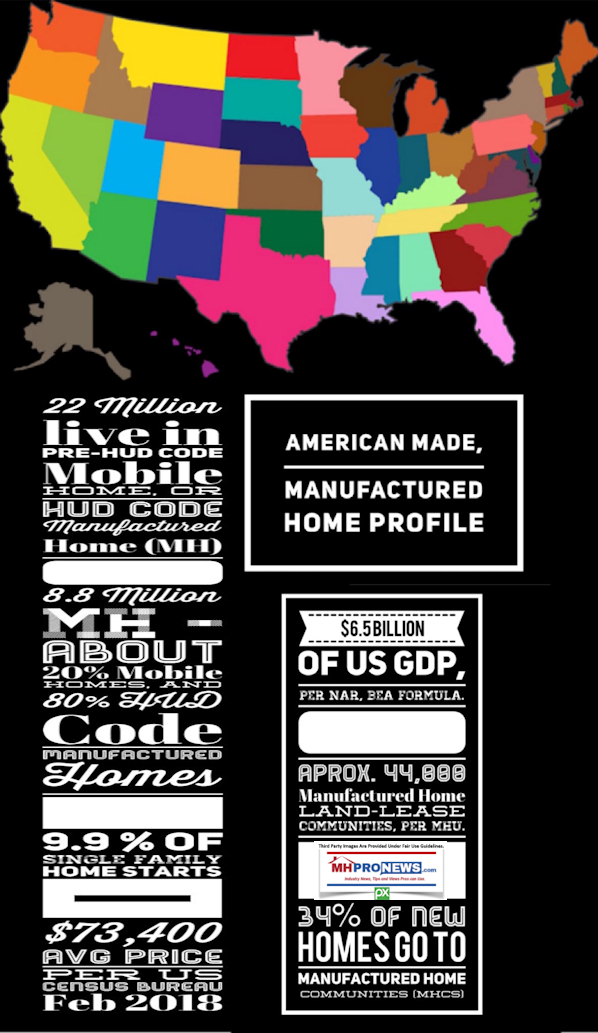
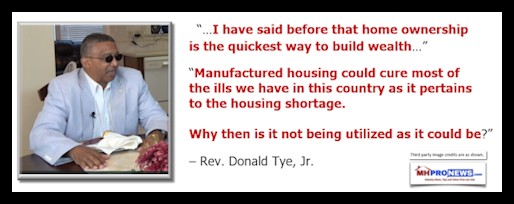
That noted, “Americans also know that new business ventures are essential to economic progress and upward mobility,” said OMI in “Entrepreneurship & Monopoly.”
In manufactured housing, there are on paper three national trade associations. The Manufactured Housing Institute (MHI) represents the bulk of the production and claims to represent “all segments of factory-built housing.” That means that post-production issues should fall into their domain.
But in fact, the other two national trade groups both sprung from MHI, each pointing to the failure of MHI to properly represent their respective interests.
The Manufactured Housing Association for Regulatory Reform says it “is a Washington, D.C.-based national trade association representing the views and interests of independent producers of federally-regulated manufactured housing.”
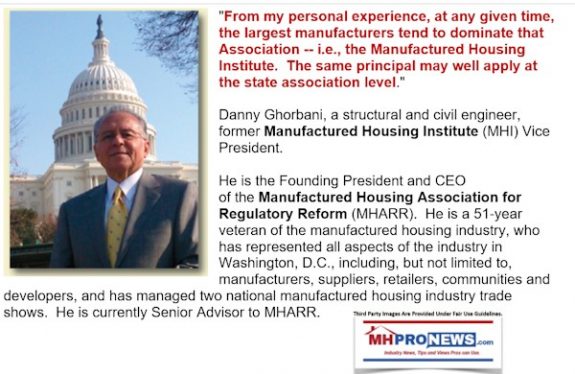
A key word above from MHARR is independent. The newly minted NAMHCO – the National Association of Manufactured Housing Community Owners put their breakaway from MHI like this.
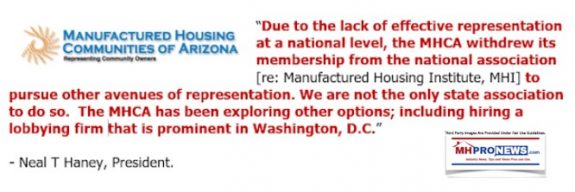
There are several industry voices that have equated MHI as the big business lobbyists, with smaller businesses there as the buffet – or Buffett? – serving-line for their next or future acquisition.
While MHI puts out an antitrust statement at their meetings, they oddly fail to give more than lip service and posturing to the interests of small business. MHI award winner, Marty Lavin put it as follows.
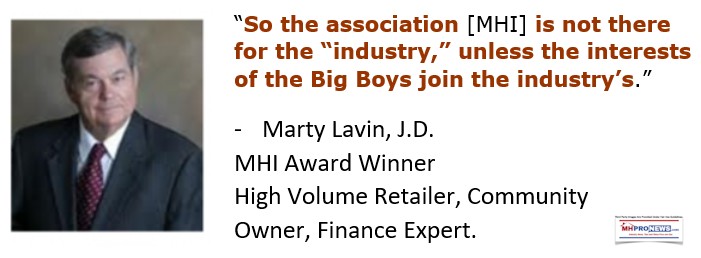
Why does that matter? OMI says that, “…startups help create an inclusive economy. They provide opportunities for women and minorities to more quickly achieve financial success and leadership than in larger firms. New enterprises also are responsible for high rates of job-creation and innovation. According to the U.S. Small Business Administration, small firms employ over half of the private-sector workforce and created nearly two-thirds of the nation’s net jobs over the past fifteen years.”
“Yet while entrepreneurship is essential to the American Dream, over the past thirty years the rate of new business formation has declined. The number of companies less than a year old, as a share of all businesses, dropped by 44 percent between 1978 and 2012. In all 50 states, the number of firm exits has outpaced new firm formation,” said “Entrepreneurship & Monopoly.”
The pattern of foiling new business startups combined with growing consolidation is a serious one for manufactured housing independents. MHI has helped document the trend on the production side.
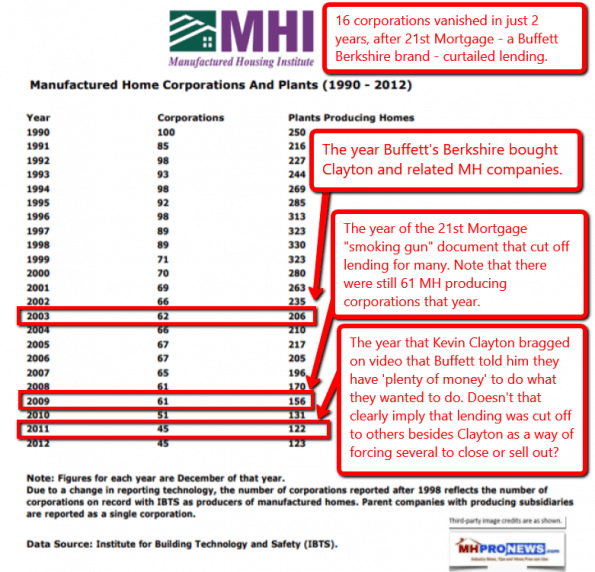
As new producers have begun to emerge during the Trump Administration, how has the largest producer behaved? Each of the text/image boxes is a hot link to a report on that topic.
MHI and Clayton, each asked to comment on the above and other topics linked from this report, have both declined to respond on numerous occasions.
The exercise of market power by companies like Clayton Homes, 21st Mortgage, and Vanderbilt Mortgage and Finance (VMF) have manifest themselves in other ways too. One notorious example is laid out in the report below.
Bridging Gap$, Affordable Housing Solution Yields Higher Pay, More Wealth, But Corrupt, Rigged Billionaire’s Moat is Barrier – manufacturedhomelivingnews.com
America woke up today to division. But perhaps 75 percent (+/-) of the nation’s people could come together on a plan that demonstrably could do the following. Increase the U.S. Gross Domestic Product (GDP) by some $2 Trillion Annually, without new federal spending.
That isn’t the only such case, as bold as it seems to be. A more recent news tip and follows up revealed the following, which officials at Knoxville declined to comment on.
CFPB and 21st, Second Shoe Drops? Flooring w/21st Mortgage Corp? Insider Tips

At the heart of these issues are access to capital, the impact of overburdensome regulations, the need for education, and timely communications. Former MHI Chairman, Tim Williams, addressed the later like this.
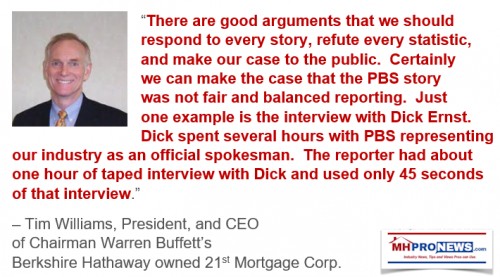
These manufactured housing related issues are much in keeping with the thesis from OMI . While noting that no one factor is to be solely blamed, OMI said “Similarly, overly broad regulations can hamstring new startups.”
OMI also adds these noteworthy points, bulleted below.
- “Another less discussed cause is a set of legislative changes that have weakened anti-monopoly laws over the past thirty years.”
- “Market concentration harms new business formation in many ways. For example, when monopolistic firms learn of new entrants, they can engage in loss-leading.”
- “Similarly, well-established firms in concentrated industries can collude with each other…”
- The impact of lower enforcement of antitrust laws has harmed small businesses, and by extension, the public, “The effects on small business and entrepreneurship have been devastating. According to the Institute for Local Self-Reliance, between 1997 and 2012, “the number of small manufacturers fell by more 70,000, local retailers saw their ranks diminish by 108,000, and the number of community banks and credit unions dropped by half, from about 26,000 to 13,000.”
Even MHI member producers have complained about the lack of independent retailers. But it was arguably the action of 21st, Clayton Homes, and Berkshire Hathaway Chairman Warren Buffett “Moat” principle that has arguably contributed to throttling thousands of independent retailers.
Legacy Housing is not the only one producer that is going into more vertical integration to counter the trends, but they are in some ways the higher profile example of the trend, given their recent IPO.
Legacy Housing IPO (LEGH) Quiet Period Set to Expire, SA’s Don Dion
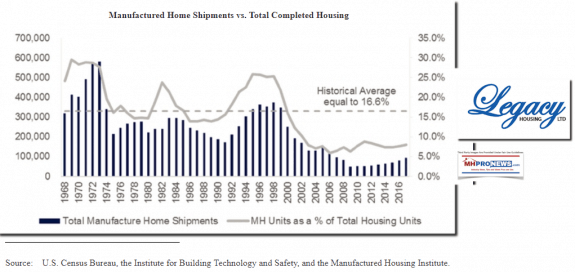
Legacy clearly believes in the future of the business, because they are raising capital to expand their retail base. Trend lines and data like the above also tell the story of how much more manufactured homes could be doing, because it did so in the past. Why aren’t more sold today? What role does market collusion and manipulation play in limiting manufactured housing, so that larger firms can acquire smaller ones at a discount?
History and Aggressiveness
An MHI member executive wrote in recently to say, “You seem pretty aggressive against MHI? There must be history there. To me, we need groups like them to move the industry forward.”
While it is debatably true that there is a need for trade groups, the better question is this. Is MHI part of the problem, or part of the solution for independents and industry growth? If they were part of the solution, than how is the vexing trend summarized below to be explained?
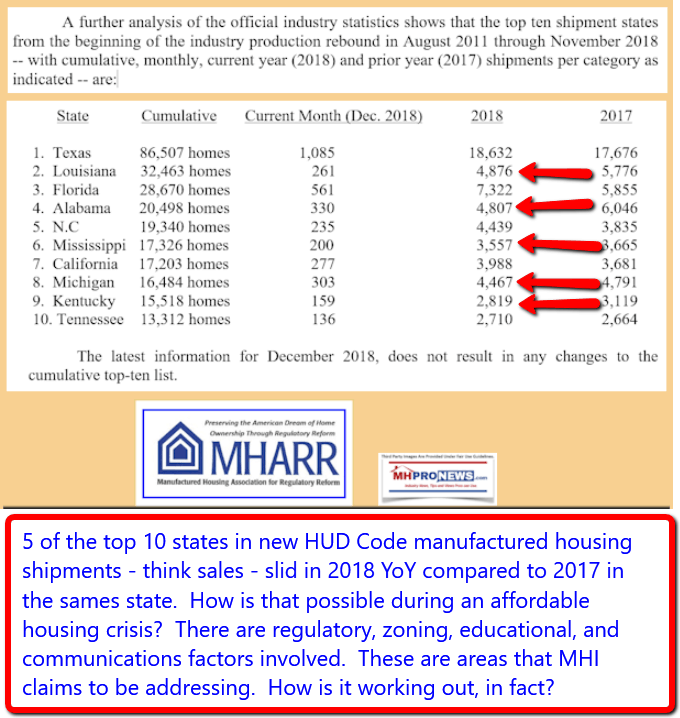
If MHI were part of the solution, why have they routinely deferred to what the monopolizing forces Omaha, NE based Berkshire, or Knoxville metro based Clayton, 21st, and VMF want?
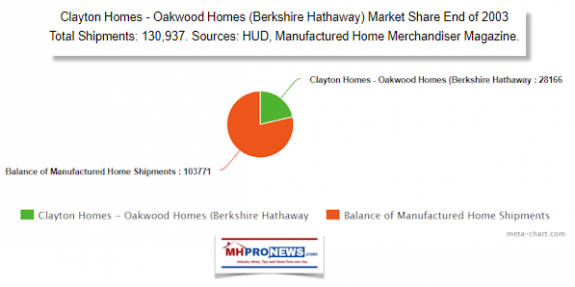
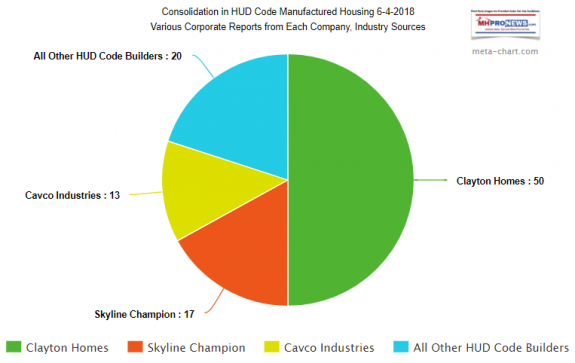
As an MHI-only member company of official complained about the way that the Duty to Serve (DTS), for example, has arguably been manipulated to serve the interests of Omaha and Knoxville, “What are we, chopped liver?” What about using DTS to serve all of manufactured housing, not just some of it? Isn’t it tragic that industry voices feel compelled to speak off the record, because they fear retaliation or career harm if they spoke their minds openly?
“What Are We, Chopped Liver?” MHI Member December 2018 Reactions
As MHARR’s president put it like this.
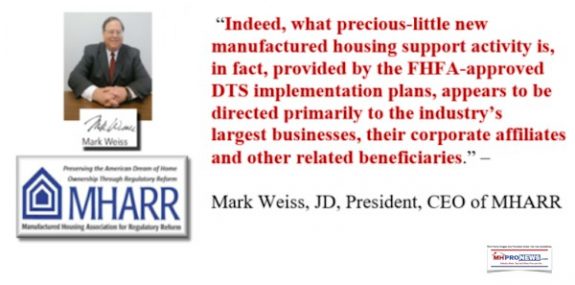
Manufactured Housing was poised to overtake conventional housing in production in the 2010s, said Harvard’s Eric Belsky.
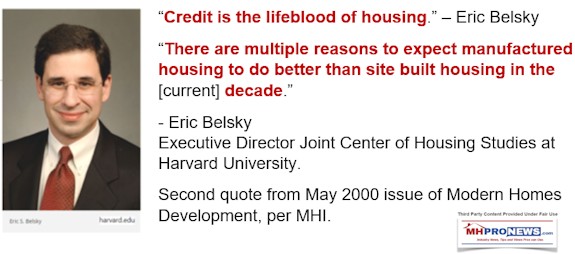
But the purported manipulation of the credit markets and other regulatory, zoning, communications and other factors have worked to foil what Belsky said was going to occur. As MHI member Frank Rolfe lamented.

The regulatory burdens, capital access, educational and communications efforts are barriers to entry as well as to maintenance, and exit for a business. That combination yields lower sales levels. In turn, the means most communities and each retailer’s businesses are worth less. That happens to play into Warren Buffett’s ‘value acquisition’ aim, plus his Moat.
Coincidences?
These various federal, state, or local level policies or the failure to robustly enforce antitrust laws ought to be front and center in the efforts of any good post-production trade group. Yet, the case linked below reflects that MHI often fails to intervene. State associations sources have told MHProNews that if they don’t do what Knoxville and Arlington, VA based MHI wants, they fear for their jobs.
A combination of federal and state investigations, plus a new post production trade group could help change these dynamics. See the related reports for more.
What is certain is that more of the same will only yield more of the same.
As to “history” between MHI and MHProNews, there is indeed history there. Our publisher was a member for years, and was elected by his peers to serve on an MHI board. But after years, there was no changes to issues like those noted taking place. Why pay a group for doing something that NAMHCO’s Neal Haney and others have said is not working for them? Why not rather forge a new association that actually does, what MHI claims to do?
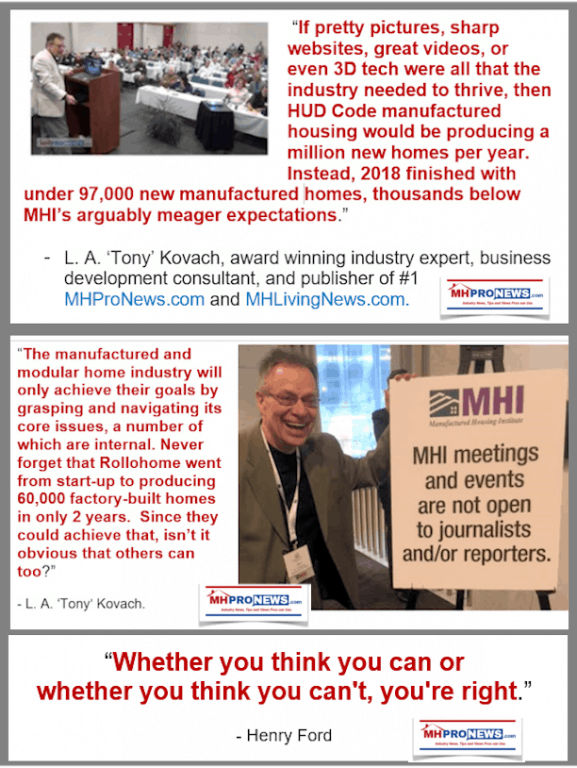
Back to OMI…
The principle of wheat and chaff has to be applied to OMI, and all others. Learn and apply what is good, but understand that sometimes an organization, person, or other source self-contradicts its own principles. It must not be construed from this article that every position that OMI takes is hereby endorsed.
That said, OMI is arguably correct on much of the history and impact of the issues that the nonprofit group raises. For a recent example, “Open Markets Institute calls on Congress and the Federal Trade Commission to immediately investigate how to protect America’s independent news media from the power and predatory business models of Google and Facebook.” That’s an issue that MHProNews has also raised for some time.
“Open Markets Institute sent a letter to House Judiciary Committee Chairman Jerrold Nadler with recommendations on how to approach the problem of monopoly this Congressional session,” noting that MHProNews recently did a focus on a top-antitrust attorney Lina Khan possibly heading to the staff of a Democratic lawmaker.
Political and professional posturing is not limited to any one party or organization. There are several ways that the Trump Administration, Democrats, and numbers in the GOP could be working together to get to the heart of much of what ails America, affordable housing, and manufactured homes role in serving the nation.
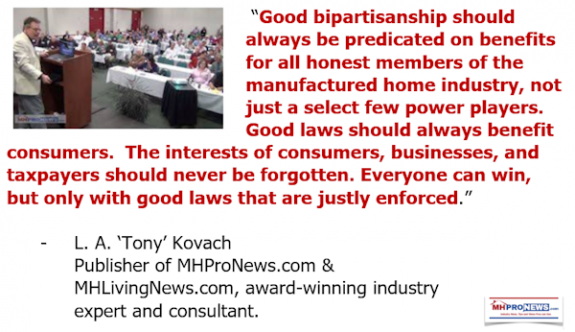
Facts, evidence, following-the-money, history, and trend-lines should speak loudly. Without real change, the industry will continue in its current funk. The fact that MHI uses apparent threats from attorneys against this former member instead of publicly engaging on the issues raised speaks volumes, see below.
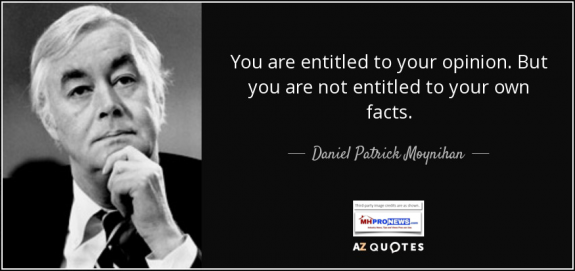

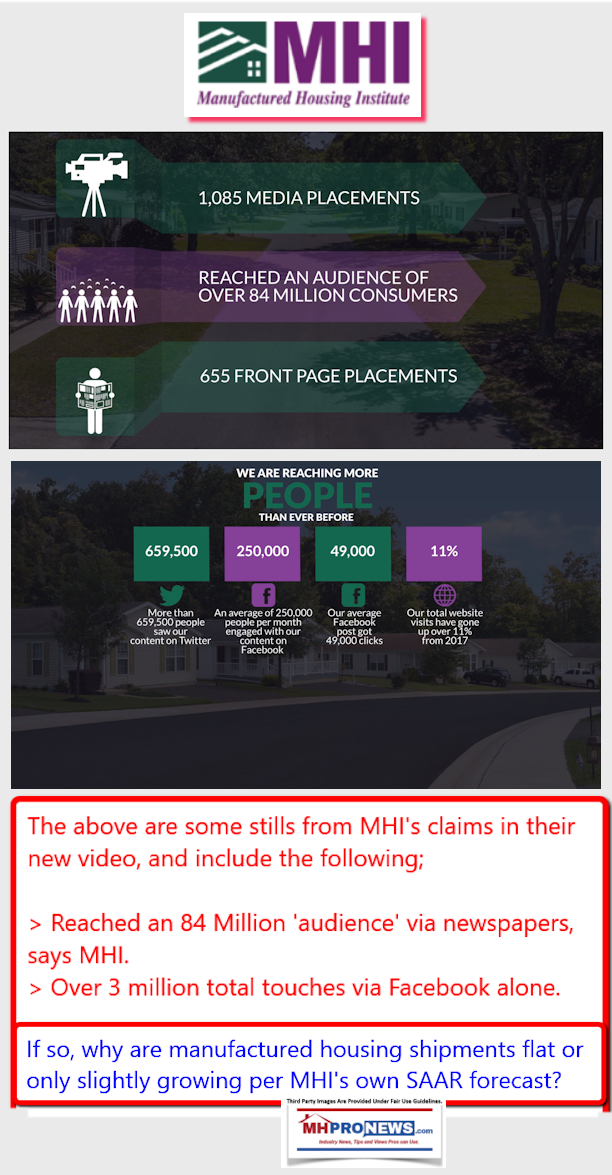
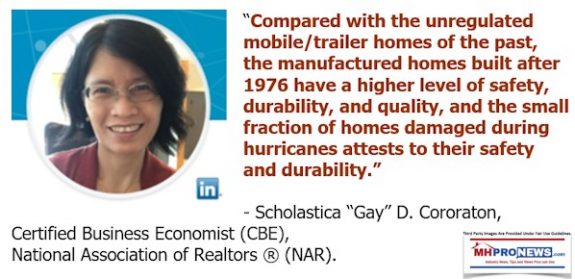
Tunica is a place where independents meet by the hundreds, and it’s a place that this dynamic could be changed, by establishing a new post-production group that will fight-like-hell for the heavenly causes that MHI has arguably laid down on.
That’s industry “News, Tips, and Views Pros Can Use,” © where “We Provide, You Decide.” © ## (News, analysis, commentary.)
NOTICE: You can get our ‘read-hot’ industry-leading emailed headline news updates, at this link here. You can join the scores who follow us on Twitter at this link. Connect on LinkedIn here.
NOTICE 2: Readers have periodically reported that they are getting a better experience when reading MHProNews on the Microsoft Edge, or Apple Safari browser than with Google’s Chrome browser. Chrome reportedly manipulates the content of a page more than the other two browsers do.
(Related Reports are further below. Third-party images and content are provided under fair use guidelines.)
1) To sign up in seconds for our MH Industry leading emailed news updates, click here.

2) To pro-vide a News Tips and/or Commentary, click the link to the left. Please note if comments are on-or-off the record, thank you.
3) Marketing, Web, Video, Consulting, Recruiting and Training Re-sources

Related Reports:
You can click on the image/text boxes to learn more about that topic.
12 Reasons to Oppose a New Manufactured Home Post Production Association
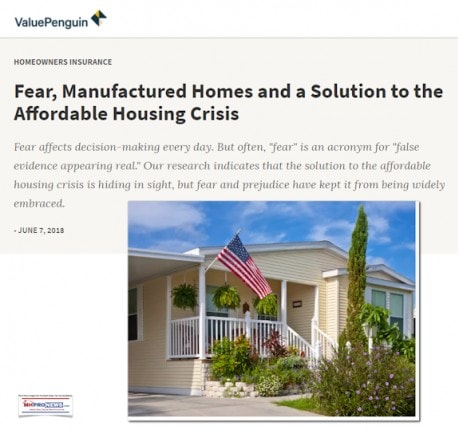
“The Illusion of Motion Versus Real-World Challenges” | Manufactured Housing Association Regulatory Reform
Motion – or, more accurately, activity – in and of itself, is not necessarily synonymous with, or equivalent to, realprogress, or, in fact, any progress at all.
HUD Code Manufactured Home Production Decline Persists – Time For Action Not Excuses | Manufactured Housing Association Regulatory Reform
Washington, D.C., February 4, 2019 – The Manufactured Housing Association for Regulatory Reform (MHARR) reports that according to official statistics compiled on behalf of the U.S. Department of Housing and Urban Development (HUD), HUD Code manufactured home production declined again in December 2018.

























